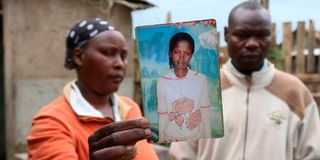
Director of Public Prosecutions Noordin Haji.
| File | Nation Media GroupNews
Premium
Agnes Wanjiru murder: Haji speaks on extradition of British soldiers
Kenya will begin extradition proceedings for the British soldiers accused of killing Agnes Wanjiru in Nanyuki nine years ago once investigations are concluded, the Nation has learnt.
Speaking in Mombasa yesterday, Director of Public Prosecutions Noordin Haji vowed to ensure justice for the family, adding that detectives had been ordered to reopen investigations into the killing.
He urged the Directorate of Criminal Investigations to fill the gaps that had been identified by the magistrate who conducted an inquest that established that Wanjiru was murdered.

Agnes Wanjiru, who was found dead in 2012 after she went missing.
“The magistrate raised some issues concerning the murder, which the DCI is investigating. It takes time to do investigations,” Mr Haji said, just a day after Defence Secretary Eugene Wamalwa said it was the DPP’s duty to explain to the country the steps he was taking to extradite the suspects.
“We have asked the DCI to take up the issues and conduct further investigations so that all the gaps are filled. Once they are done, they’ll forward the files to us then we shall start the legal processes to ensure those culpable are extradited to face prosecution,” he added.
Mr Wamalwa had told the National Assembly Committee on Defence and Foreign Relations on Tuesday that the British government is ready to avail the suspects to face murder charges under the extradition treaty between the two countries.
“The government is pursuing justice for Wanjiru and her child at the highest level of the British authorities. We have the legal and institutional framework to deal with this murder but how the prosecution will be done falls squarely in the purview of the ODPP,” he said.
Kenya and UK governments have signed a new Defence Cooperation Agreement that will guide the two countries’ mutual interests in the next five years.
MPs have threatened to halt the ratification of the agreement unless and until the soldiers who reportedly killed Wanjiru are extradited.

Agnes Wanjiru, who was found dead in 2012 after she went missing.
Mr Wamalwa said the defence agreement that expired in October gives Kenya the primary jurisdiction for the trial of suspects, saying British officials were ready to support any request to extradite their soldiers.
“The British have ceded that Kenya is the primary jurisdiction on Wanjiru’s murder,” he said.
The British government is reportedly willing to process the extradition of the suspects once Kenya makes a request after investigations are done.
Britain’s Armed Forces Minister James Heappey had earlier this month said the legal jurisdiction lies with the government of Kenya, where the murder of Wanjiru was committed.
“I am not immediately clear right now on the arrangements for extradition between the UK and Kenya, but absolutely everybody in the UK government is aware of how Agnes’s case has affected the Kenyan public, and we want you to know that we take that very seriously and we want justice to be done for her,” he said.

Relatives of Agnes Wanjiru, who was murdered nine years ago in Nanyuki, display her photograph in Nanyuki town on October 25, 2021.
“If there are further allegations that come to light, absolutely no stone will be left unturned in making sure that we provide all the information necessary to the Kenyan authorities to investigate these claims. The UK has nothing to hide here. We want those responsible to be brought to justice because Agnes and her family have already had to wait too long,” he added.
Principal Magistrate Njeri Thuku, who presided over the inquest, established that Wanjiru was murdered.
One of the witnesses who testified at the inquest said a guard at the hotel in which Wanjiru was last seen told her that there had been a brawl in a room in which she had been with two British soldiers. There was a broken mirror while blood was splattered all over the walls.

A cyclist rides a bicycle past Lion's Court Lodge in Nanyuki town where Agnes Wanjiru was murdered nine years ago.
The magistrate faulted the management of the hotel after it claimed that it only knew about Wanjiru’s disappearance after her body was discovered in a septic tank in the precincts of the hotel.
Interestingly, the security guard was never called to testify at the inquest.
“I find it hard to imagine that a management of a hotel would consider it usual to find a broken mirror and blood in a room,” Ms Thuku observed.
“This paints to signs of a cover up of a misdeed committed in their premises and should be a subject of investigation by the ODPP.”
DCI boss George Kinoti yesterday did not respond to our queries on the status of the fresh investigations.
Thousands of soldiers have received training from the British Army Training Unit Kenya (Batuk) camp in Nanyuki.
Batuk consists of around 100 permanent staff and a reinforcing short tour cohort of another 280 personnel. Under an agreement with the Kenyan government, up to six infantry battalions per year carry out eight-week exercises in Kenya.
There are also Royal Engineer exercises, which carry out civil engineering projects, and medical deployments which provide primary health care assistance to the civilian community.





